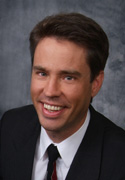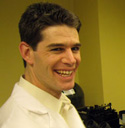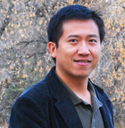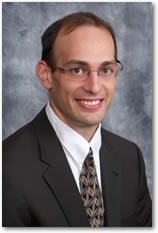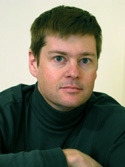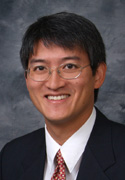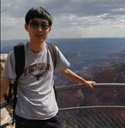People
Stephen Boyes
- The general theme of Prof. Boyes' research involves the design and application of novel polymer brush systems. Polymer brushes refer to an assembly of polymer chains, which are tethered to a surface or interface in close enough proximity to force the chains to stretch away from the surface. Potential applications for polymer brushes range from tailoring of surface properties and colloidal stabilization to controlled delivery systems and nano-reactors for chemical and biological reactions. He is taking advantage of recent advances in both surface modification techniques and polymer synthesis methodologies to prepare complex polymer brush systems for both practical application and theoretical study. He also has interests in the development and application of controlled/“living” free radical polymerization techniques for both surface initiated and solution based polymerizations.
Research Activities
- Synthesis of novel stimuli responsive polymer brushes
- Polymeric templates for the preparation and application of catalytic nanoparticles
- Controlled drug delivery using biocompatible polymer brushes
- Surface modification and orientation of single wall carbon nanotubes and metallic nanorods with phase separated block copolymers
- Polymer assisted formation of metallic nanowires
- Controlled/“living” free radical polymerization chemistry and kinetics
More Info
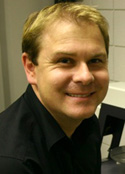
John R. Dorgan
- Professor Dorgan's research group works in the area of soft materials and complex fluids. A particular interest within the group is sustainability; many of our projects are directly involved in making useful polymeric materials and composites from renewable resources. Theoretical interests are in non-equilibrium thermodynamics, including Landau-Ginzburg models for phase transitions. Computational techniques focus on Monte Carlo simulations. Experimentally, the group uses rheology, ellipsometry, and scattering techniques to unravel the complex structure of macromolecular systems.
Research Activities
- Nanomaterials – Nanoblends for polymer membranes, polymeric nanocomposites
- Theory and Simulation – Non-equilibrium thermodynamics, multi-scale modeling, molecular simulaton
- Rheology of Complex Fluids – Rheology of bioplastics, heavy oils, renewable resources, and biofluids
More Info
Dan Knauss
- Professor Knauss' research involves the design, synthesis, and study of novel polymers that are applicable to a wide variety of advanced technologies. The fundamental and applied research projects currently focus on polylactides and other polymers from renewable resources, dendritic and complex branched polymers, the development of routes to the production of core-shell polymeric nanoparticles, design of polymers with unique functionality, novel thermoplastic elastomers, high performance polymers, and polymerization from surfaces. The research makes use of skills in living and controlled polymerization techniques, monomer and polymer design, and step-growth polymerization.
Research Activities
- Controlled polymerizations including living anionic and controlled radical
- Block copolymer synthesis and characterization
- Synthesis and characterization of unique branched polymer architectures
- Nanoparticle and microparticle synthesis
- High temperature and high performance polymers
- Polymers from renewable resources
More Info
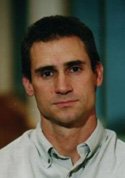
Keith Neeves
- The long-term goal of Professor Neeves' research is to develop methods that can predict an individual’s bleeding potential. Bleeding potential refers to the ability of your blood to form a stable blood clot. Certain genetic bleeding disorders like hemophilia and von Willebrand disease diminish an individual’s ability to form a stable clot. While diseases like myocardial infarctions, stroke, and deep vein thrombosis are examples of unrestrained clot growth, which is known as thrombosis and is the leading cause of death in the United States.
More Info
Hongjun Liang
- Professor Liang's research focuses on multiple-component materials that are cooperatively integrated and manifest unique functions. The central theme of his research is to study the interactions between “soft” molecular assemblies and “hard” engineered surfaces at different length scales, which have direct impacts on human health and environmental safety issues, bio-inspired diagnostic and sensing, renewable energy conversion and storage, as well as many other disciplines. Group members of the Liang research group perform research in the fields of polymers, nanomaterials, biomaterials, protein engineering, and organic/inorganic self-assembly.
More Info
Matt Liberatore
- Rheological and spectroscopic characterization tools provide information on nanoscale domains, microstructure and macroscopic properties, which enables constructing structure-property relationships. Prof. Liberatore's work focuses on the characterization of nanofibers, entangled polymer solutions and surfactant-polymer mixtures.
Research Activities
- Understanding of complex fluids using rheology, rheo-optics, scattering and phase behavior
- Mechanical characterization of electrospun polymer fibers materials from single fiber to nonwoven mat
- Flow-induced structure formation of entangled polymer solutions for drag reduction in naval application and vascular systems
- Nanostructured viscoelastic polymer-surfactant mixtures from renewable resources
More Info
David W.M. Marr
- Prof. Marr's work focuses on the integration of colloids and colloidal dispersions into microfluidic geometries for control of microscale transport. In this he employs external fields, including applied light, electric, and magnetic fields to not only direct microdevice assembly but also to drive device operation and function. This work directly supports the themes of Field and Flow Based Transport andNnanomaterials and Nanotechnology.
Research Activities
- Cell separation via optical forces
- Control of microfluidic transport
- Electric field induced assembly of colloidal and protein crystals
- Magnetic field assembly and control of microscale devices
More Info
Kim R. Williams
- Analytical techniques are continuously challenged by the unfolding intricacies of nature, the increasing complexities of new engineered materials, and the need to study the interactive behavior of individual components within complex systems. Prof. Williams’ research centers on the development of analytical techniques such as field-flow fractionation (FFF), liquid chromatography, MALDI TOF mass spectrometry, and light scattering and their application to nanometer and micrometer sized materials. This work forms a part of the center’s emphasis on Field & Flow Based Transport and Nanomaterials & Nanotechnology.
Research Activities
- Systems science: how different components within a system interact and influence overall behavior or property
- Separation and light scattering methods for analyzing high and ultrahigh molecular weight macromolecules and supramolecular assemblies
- Separation and detection of microgels, nanoparticles, core-shell, liposomes, and bacteria
- MALDI TOF mass spectrometry of polymers
- FFF/MALDI TOF mass spectrometry of pathogenic microorganisms and polymers
- Thermal FFF, Flow FFF, Sedimentation FFF
More Info
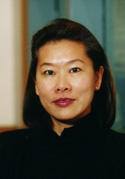
David T. Wu
- Prof. Wu’s research involves theory and simulation of polymers and complex fluids. His activity is primarily in the Center Themes of Nanomaterials & Nanotechnology, and also Field & Flow Based Transport, but also supports other experimental (synthetic and characterization) activities in the center.
Research Activities
- Predictive models for thermodynamics, segregation and structure of polymers
- Branched polymers: kinetic control of architecture, segregation and thermodynamics
- Nanoactive polymer brush surfaces
- Statistical mechanics of granular materials
- Viral self-assembly: statistical mechanics and kinetics
- Electrohydrodynamic assembly in colloids and proteins
More Info
Xiaolong Yin
- Prof. Yin’s research involves suspension, multiphase flow, transport and reactions in porous media, and EOR processes.
Research Activities
- Dynamics of binary gas-solid and liquid-solid suspensions
- Simulation of single- and two-phase flows in 2D/3D computer-generated random porous medium
- Numerical modeling of CO2 sequestration in saline aquifers
- Experimental study of porosity / permeability change induced by change in pore pressure
- Slim tube study of MMP in CO2-EOR applications
More Info

